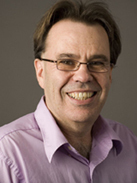
Research led by Professor Rory McVeigh, chair of the Department of Sociology, has identified two community characteristics that, when present, appear to increase opposition to same-sex marriage.
The study, co-authored with 2010 Ph.D. recipient Maria-Elena Diaz, was the featured article in the December 2009 issue of the American Sociological Review, the flagship journal of the American Sociological Association.
“In recent decades, Americans in general have become more accepting and more tolerant in regard to homosexuality, especially in terms of ‘Maybe it’s not for me, but it’s wrong to discriminate,’” McVeigh says. “Many people view banning same-sex marriage as discrimination based on sexual orientation. Strong opposition to same-sex marriage, therefore, is something of a puzzle in light of this general trend.”
He and Diaz, who is now an assistant professor at the University of Oklahoma, analyzed county-by-county voting on proposed same-sex marriage bans in 28 states between 2000 and 2008. Although most bans passed by lopsided margins, voting outcomes varied widely by county.
As they expected, the results show that opposition to same-sex marriage is higher in communities whose residents tend to assume traditional gender roles and family structures. Perhaps more noteworthy, however, is the finding that this opposition is particularly strong in places where traditionalism combines with a lack of cohesiveness, as evidenced by factors such as high residential instability, low rates of home ownership, and high crime rates.
Their analysis brings together two different theoretical perspectives that have been applied in studies of people’s attitudes about sexual orientation, McVeigh says. One emphasizes ways in which traditional gender roles and family structure promote conservative views on the issue. The other approach links attitudes to social disorganization and perceived threats to majority interests and values.
McVeigh points out that conservative activists have promoted the idea that same-sex marriage is harmful to society at large, and the results of the study suggest that this message resonates most powerfully in certain communities.
“The interesting thing is that this effect of traditionalism grows even stronger in those communities that are characterized by weak community cohesion,” he says. “If people are already predisposed to the conservative argument based on their being embedded in a community that is traditional, the argument [against same-sex marriage] is more likely to ring true.”
This argument, however, fails to connect in communities that aren’t as traditional in regard to gender roles and family structure; in those places, people are more likely to support same-sex marriage.
The study also shows that religious distributions are related to voting outcomes. After controlling for numerous other factors, opposition to same-sex marriage tends to be stronger in counties with high proportions of evangelical Protestants and weaker in counties with high proportions of Catholics.
McVeigh says that this line of research, like his recent book, The Rise of the Ku Klux Klan: Right-Wing Movements and National Politics, emphasizes the importance of examining community attributes when trying to understand political action.
h3(alt): Learn More >


